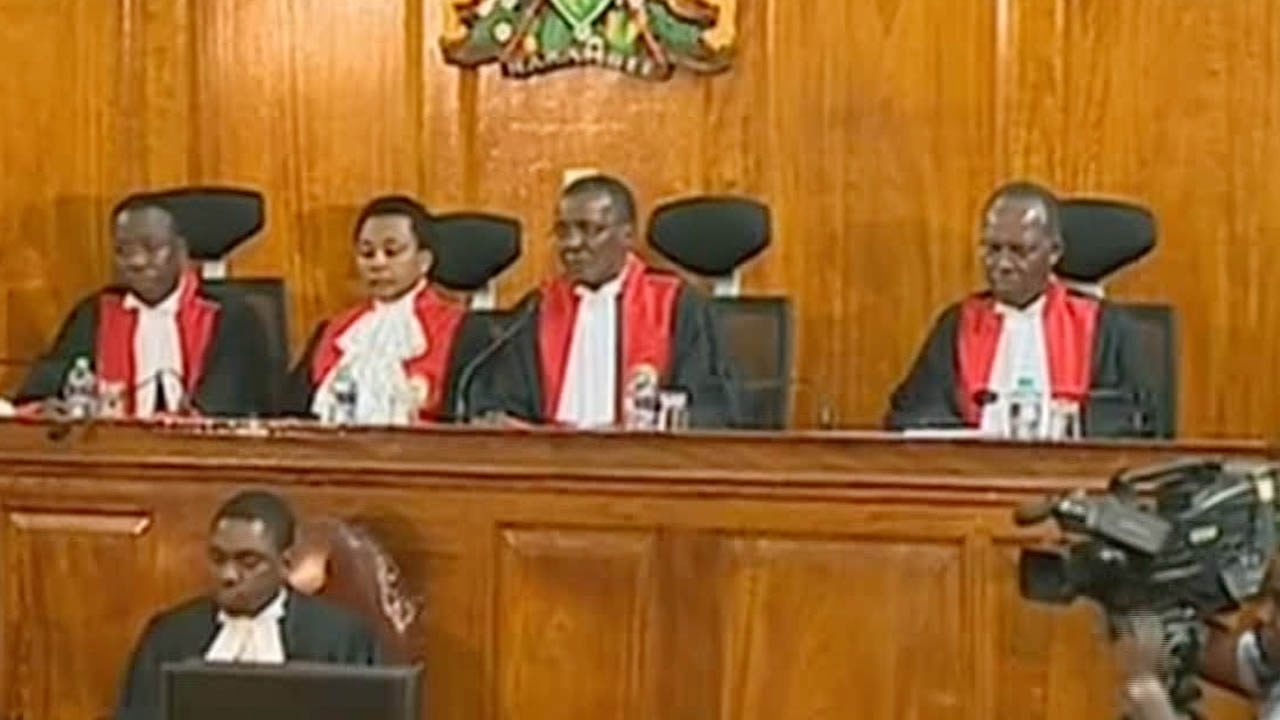Kenya's Supreme Court on Friday annulled last month's presidential vote, saying the electoral board committed "irregularities and illegalities," which harmed the integrity of the election that handed President Uhuru Kenyatta a second five-year term and ordered a new vote in 60 days.
Four out of six judges said the vote had been harmed by irregularities. Judges then allowed the two dissenting justices to read their opinions before giving their verdict on whether the irregularities were serious enough to nullify the election results.
International observers had said they saw no sign of manipulation of voting and tallying at polling stations. Several observers said the opposition did not conduct a parallel tally and had not challenged results with complete data of their own.
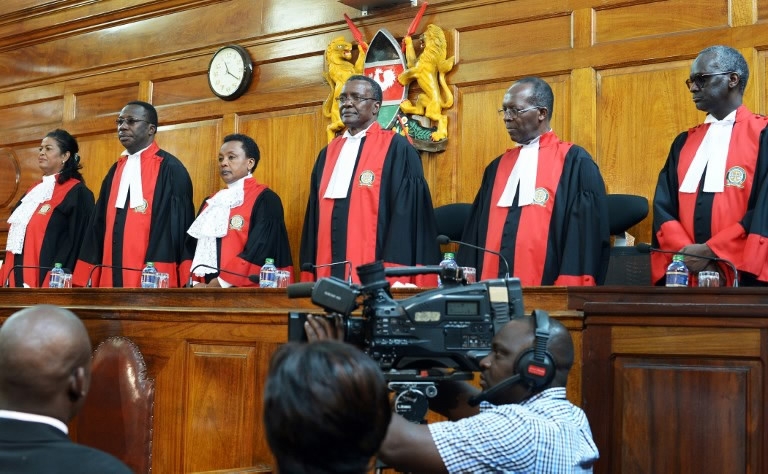
Judges stand to deliver their verdict at the Supreme Court in Nairobi on September 1, 2017, ordering a new presidential election within 60 days after cancelling the results of last month's poll. /AFP Photo
Judges stand to deliver their verdict at the Supreme Court in Nairobi on September 1, 2017, ordering a new presidential election within 60 days after cancelling the results of last month's poll. /AFP Photo
New race starts
The decision to cancel the result sets up a new race for the presidency between Kenyatta and veteran opposition leader Raila Odinga.
After the August 8 poll, Odinga and his National Super Alliance (NASA) charged that the transmission of electronic results to a national tallying center was riddled with irregularities.
For this 72-year-old opposition leader, the court decision represented a rare victory in his political career. He hailed the ruling as historic.
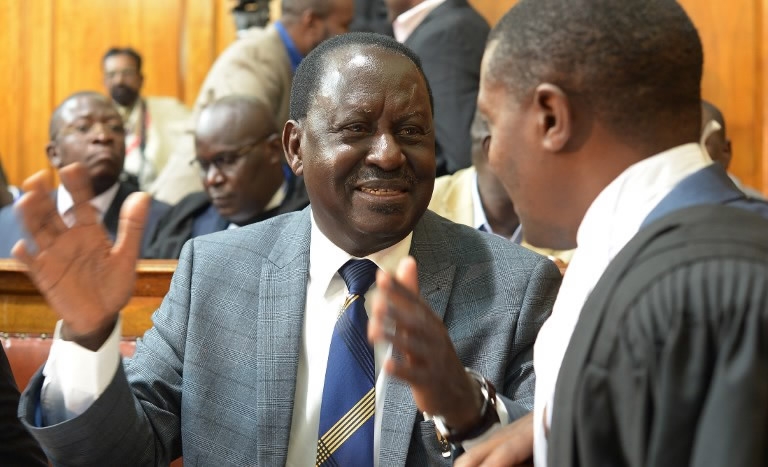
Kenya's Opposition presidential candidate Raila Odinga (L) reacts at the Supreme Court in Nairobi on September 1, 2017. /AFP Photo
Kenya's Opposition presidential candidate Raila Odinga (L) reacts at the Supreme Court in Nairobi on September 1, 2017. /AFP Photo
"This is a historic day for the people of Kenya and by extension for the people of the continent of Africa," said Odinga.
He said it was the first time a presidential result had been overturned in Africa.
Kenya's President Uhuru Kenyatta later addressed the nation saying that he disagreed with a Supreme Court ruling that nullified his win in last month's presidential election, but that he would respect the decision and urged citizens to do the same.
"The court has made its decision. We respect it. We don’t agree with it. And again, I say peace ... peace, peace, peace," he said.
It was the third time in a row that Odinga cried foul, claiming he was cheated out of rightful victory after losing elections in 2007 and 2013.
The disputed 2007 election led to politically-motivated ethnic violence in which over 1,100 people were killed. In 2013, Odinga took his grievances to court and lost.
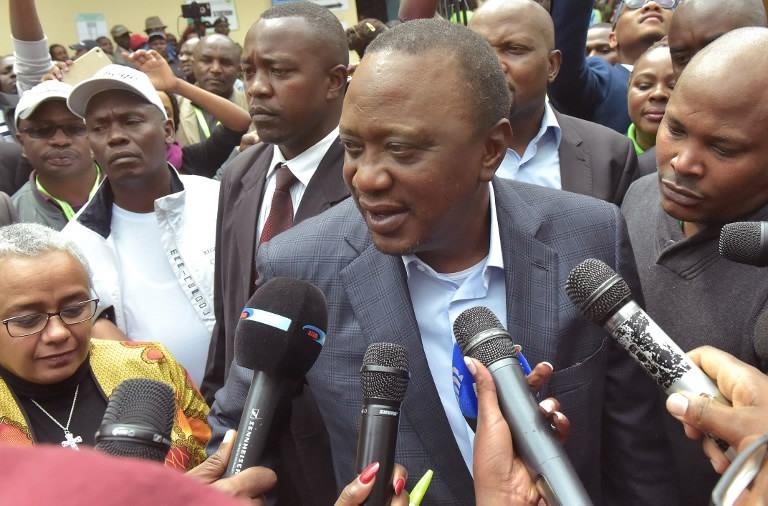
Kenya's President Uhuru Kenyatta speaks to the media after voting at a polling station during the presidential election in Gatundu, Kiambu county on August 8, 2017. /AFP Photo
Kenya's President Uhuru Kenyatta speaks to the media after voting at a polling station during the presidential election in Gatundu, Kiambu county on August 8, 2017. /AFP Photo
Election commission to make change
Independent Electoral and Boundaries Commission (IEBC) chairman Wafula Chebukati vowed on the same day to make staff changes ahead of a new presidential vote ordered by the Supreme Court, which said it had failed to conduct a valid election last month.
“The commission intends to make internal changes to our personnel … as we prepare for the fresh presidential election in 60 days,” Chebukati said at a press conference.
He ruled out resigning himself, saying he had not been implicated in any wrongdoing.
“The commission invited the office of the director of public prosecutions to urgently investigate and prosecute any of our staff that may have been involved in violations of the election offenses act,” he said.
A NASA official and lawyer, James Orengo, had argued that irregularities, including unsigned and fake tally forms, hacked servers and deliberate miscounting, had affected around one-third of the 15.5 million votes cast.
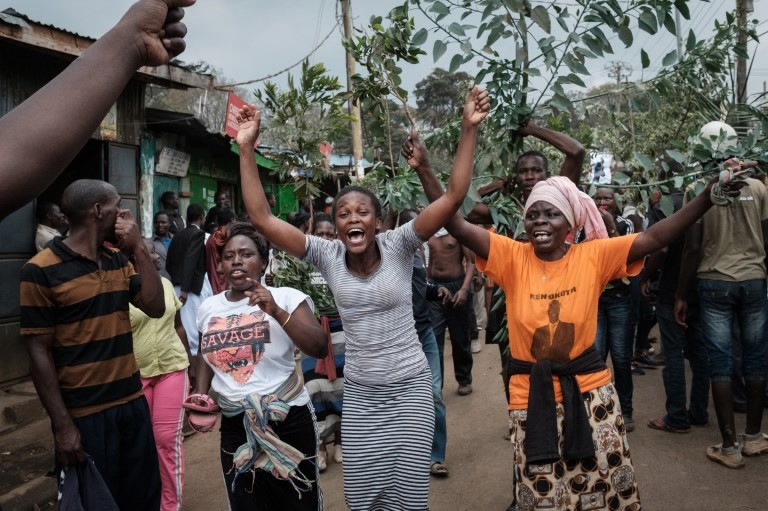
Supporters of Kenya's opposition National Super Alliance (NASA) celebrate in a street of Kibera slum in Nairobi, on September 1, 2017. /AFP Photo
Supporters of Kenya's opposition National Super Alliance (NASA) celebrate in a street of Kibera slum in Nairobi, on September 1, 2017. /AFP Photo
But lawyers for the election commission and Kenyatta countered that errors were simply "clerical" mistakes and technicalities that did not affect the outcome of the vote.
A report filed by the court registrar found a number of errors in the 41,451 polling station tally sheets, known as form 34A, as well as in 291 of the form 34B constituency tally sheets, some of which were unsigned, not stamped, illegible or lacking serial numbers or watermarks.
In addition, the registrar's report found that the electoral commission failed to provide full court-ordered access to its servers, which NASA had demanded in order to back up its allegations of hacking.
The current crop of IEBC commissioners took office only seven months before the election, after their predecessors were forced to step down following widespread protests against them.
Source(s): AFP
,Reuters

